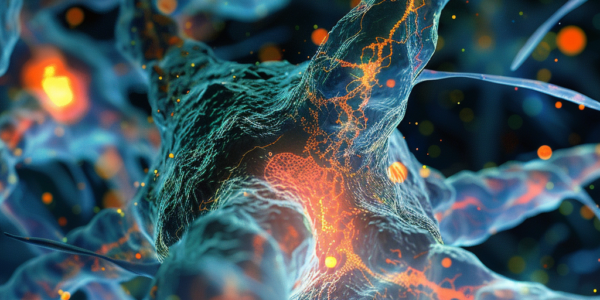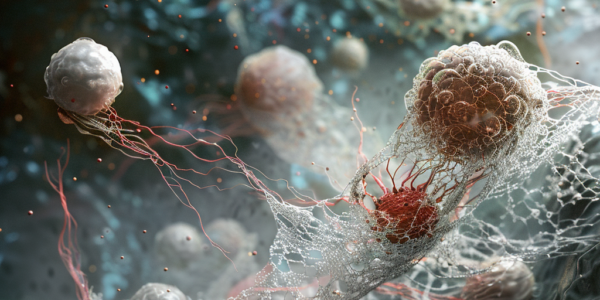Persistent Disparities in Breast Cancer Survival Rates at the Neighborhood Level Revealed in Recent Study
Recent research in JAMA Network Open reveals persistent disparities in breast cancer survival rates at the neighborhood level, despite advancements in screening and treatment. Neighborhood disadvantage impacts access to essential services, leading to shorter survival rates. Targeted interventions are needed to address these disparities and improve outcomes.
Yale Researchers Uncover Genetic Landscape of Neuroendocrine Tumors of the Cervix
Researchers from Yale School of Medicine have made significant strides in understanding the genetic landscape of neuroendocrine tumors of the cervix (NETc) to potentially improve treatments for this rare and aggressive disease. The study, published in the Proceedings of the National Academy of Sciences, unveiled novel genes and pathways that could pave the way for precision medicine approaches in treating NETc patients. Dr. Alessandro Santin emphasized the importance of genetic data in guiding the development of innovative therapies, suggesting a combination of common chemotherapy regimens with immunotherapies for a more effective treatment strategy.
Groundbreaking Advancement in Cancer Treatment with Protein Micromaterials
Researchers at the Autonomous University of Barcelona have developed groundbreaking micromaterials composed of proteins for targeted cancer treatment. These self-contained micromaterials mimic natural secretory granules, delivering nanoparticles to specific cancer cells for destruction. The technology, patented by the researchers, has shown high performance in animal models of colorectal cancer, offering potential for enhanced drug efficiency and patient comfort while minimizing side effects.
Israeli Researchers Make Breakthrough in Treatment of Bone Metastasis in Breast Cancer Patients
Israeli researchers at Tel Aviv University have developed a new therapeutic strategy using existing medications to inhibit the spread of breast cancer to the bone, offering hope for improved treatment strategies and potentially impacting other types of cancer as well. The groundbreaking study utilized animal models and tissue samples from patients to demonstrate the efficacy of the new approach, providing new insights into combating the spread of cancer to the bone.
7-Year-Old Diagnosed with Rare Inoperable Brain Tumor
A 7-year-old boy from the UK has been diagnosed with a rare form of inoperable brain tumor, DIPG, with a grim prognosis. His family is exploring alternative treatments and has set up a GoFundMe to support his treatment.
Second-Generation Anti-Cancer Vaccine Targets Melanoma
Defence Therapeutics Inc. has announced the successful testing of a second-generation anti-cancer vaccine, ARM-002TM, using its lead anti-cancer molecule AccuTOX®. The vaccine led to an 80% complete response when combined with the anti-PD-1 immune checkpoint inhibitor in a melanoma cancer model. This breakthrough in cancer treatment is expected to have a significant impact on the industry, with the vaccine segment projected to reach revenues of about $900 billion by 2029.
Study Finds Micro- and Nanoplastics Passed on During Cell Division
A recent study reveals that micro- and nanoplastic particles persist in the human body and are transmitted to newly formed cells during division, potentially enhancing tumor metastasis. The findings, published in ‘Chemospheres’, highlight the effects of plastic particles on cancer cells in the gastrointestinal tract.
Enobosarm Shows Promising Antitumor Activity in ER-Positive, HER2-Negative Advanced Breast Cancer
A recent study published in The Lancet Oncology has shown promising antitumor activity of enobosarm in patients with ER-positive, HER2-negative advanced breast cancer. The study assessed the activity and safety of enobosarm in women with previously treated locally advanced or metastatic breast cancer, with results showing potential benefits but also some drug-related adverse events. The study was funded by GTx, the original developer of enobosarm, and has implications for the potential role of androgen receptor modulation in cancer therapy.
Enzyme Checkpoint Identified in Tumor-Associated Macrophages
A recent study has identified an enzyme, phosphoglycerate dehydrogenase (PHGDH), as a metabolic checkpoint in the function of tumor-associated macrophages (TAMs), affecting tumor growth. Targeting PHGDH could be a new approach in cancer treatment, potentially improving the effectiveness of clinical immunotherapies. The study utilized innovative methods, including AI and machine learning, to diagnose metabolic markers and identify checkpoints, leading to the discovery of the metabolic checkpoint in macrophage polarization.
Study Reveals Potential Link Between Chronic Stress and Cancer Metastasis
A recent study from Cold Spring Harbor Laboratory Cancer Center has revealed a potential link between stress and cancer metastasis, paving the way for new treatment strategies. Chronic stress has long been known to have detrimental effects on health, increasing the risk of conditions such as heart disease, strokes, and potentially aiding in the spread of cancer. The study found that stress induces the formation of sticky web-like structures by certain white blood cells, rendering body tissues more susceptible to cancer metastasis. The implications of these findings are profound, potentially offering new avenues for treatment strategies to curb the spread of cancer in stress-induced conditions.










